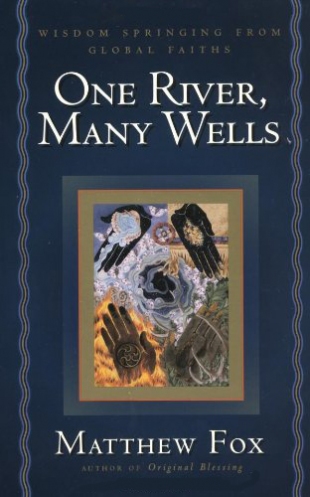An Excerpt from One River, Many Wells: Wisdom Springing from Global Faith by Author
Matthew Fox has written a wide-ranging and substantive sourcebook on the spiritual wisdom of the world's religions. Here is an excerpt on justice..
"It is not just the young who must seek authentic warriorhood today. As a species, we need to be strong to resist the onslaught of myths of progress, consumerism, and consequent degradation.
"Thomas Berry writes about the roles of the warrior and hero in the Native American consciousness. The Indians have never accepted human life as ordinary, as something that can be managed in a controlled or painless manner. They realized that life tests the deepest qualities within the human personality, qualities that emerge in heroic combat not merely with others, but also with oneself and with the powers of the universe. The sacred function of enemies was to assist one another to the heroic life by challenge, even by the challenge of death. The existence of challenges instead of mere comforts and acquisition of comforts is what brings alive the warrior in us. Today, with so many 'enemies' confronting us internally and externally — greed and envy, violence and self-pity, fear and sloth, is it any wonder that the return of the spiritual warrior is called for? Fasting, service, sundancing, and other generous acts of giving to the community are all ways to develop warriorhood. The warrior takes on enemies, both internal and external.
"A warrior defends what is beautiful; a warrior defends Creation and its light; a warrior defends what the community cherishes; a warrior assists the community to survive. A warrior's heart must be strong but also creative; it must be connected to the whole; it must know quiet and solitude as well as busyness and engagement. It must be familiar with nothingness and it must have tasted joy. It must know service as well as sacrifice. In short, it must know spirit.
"The violence of our culture and its cultural institutions instructs us to take for granted from an early age that all warriorhood is about killing for the empire or the nation or the corporation or even for our religions. The very term 'warrior' to most people smacks of the military.
"But that has not always been the case. I am reminded of a Native American student in our university who had been a soldier in the Vietnam War. On returning home to his tribe, his elders said to him: 'You have been a soldier. Now we will make you a warrior.' His training to be a warrior took four years. I asked him what was at the heart of this training, and he related this story. The elders taught him to play the flute, which he learned to do very proficiently. When they felt he was ready to play before the whole tribe, everyone gathered. As the evening came to an end, and all were touched by his playing, each elder came up to him with a knife in his hand and cut a chunk of wood out of his flute. At the end of the evening, he had no flute. When I quoted Eckhart to him, the soul grows by subtraction, he exclaimed: 'That is it! All my training as a warrior was like that.'
"Spiritual traditions the world over embrace the archetype of warriorhood, for it takes a stout heart, a determined mind, a focused intention, a very awake person, to be a successful warrior. A warrior defends what he or she cherishes when it is threatened. A warrior is a lover defending the beloved. A prophet is a warrior — the energy of the prophets of Israel was very much a warrior energy. A warrior responds to moral outrage, feels injustice in the gut like a kick to one's solar plexus, and responds with ingenuity and creativity. It may be that not only our nation-state and corporate state worldviews have limited our understanding of warriorhood but also our sexism. A patriarchal culture needs to deny women their warriorhood, deny women their masculine and assertive role.
" 'Femininity,' being 'ladylike' and going shopping and doing homemaking without any option — all this is part of putting down the inherent warriorhood of women. It serves the purposes of entrenched power to teach people to stifle their spiritual warriorhood and channel its energy exclusively to soldierhood or war-making on behalf of the powerful.
"St. Teresa of Avila was a spiritual warrior — she took on the established church of her day, outmaneuvering the powerful Inquisition itself, and the privileged classes who were quite literally dumping their unmarried daughters into convents, convents which she committed her considerable energies to cleaning up. By so doing, she took on powerful forces in sixteenth-century Spain. She did not flinch. She was a warrior. It is interesting that in her writings she offers at least fifty images of soul and about 90 percent of these are masculine. She calls her soul a castle, a garrison, an army, a king — all images that rose in her psyche that bespeak her warriorhood.
"Hildegard of Bingen was also a spiritual warrior, taking on as she did many powers of her day, including bishops, archbishops, abbots, merchants, clergy, and even the pope. No shrinking violet there. No introspective conscience rotting on the inside, no passive/aggressive Christian who is sentimental on the outside but violent on the inside, Hildegard called her sisters and others to their noble roles to fight injustice and embrace compassion."
Back to reading a full review of this book.
